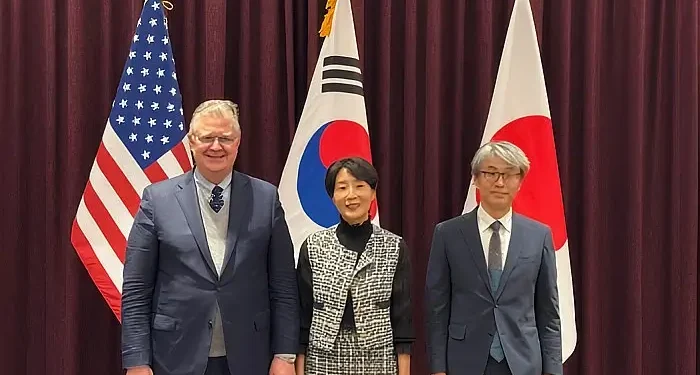The second Trilateral Indo-Pacific Dialogue marked a pivotal moment in fostering collaboration among the United States, Japan, and South Korea.
Held in Tokyo on December 11, 2024, this meeting reinforced the trio’s commitment to enhancing regional security, advancing economic resilience, and addressing shared challenges in the Indo-Pacific region.
Advancing Security and Stability
In a time of growing geopolitical complexities, the Indo-Pacific Dialogue highlighted the necessity of collective efforts to maintain stability. The representatives reaffirmed their commitment to:
- Upholding international laws, including freedom of navigation and overflight.
- Strengthening maritime security with a newly announced trilateral law enforcement framework.
These initiatives aim to ensure the security of vital trade routes and safeguard the region from emerging threats.
Maritime Security in Focus
Maritime security stood out as a cornerstone of the discussions. The parties pledged to improve coordination on:
The Focus |
Action Plans |
|---|---|
| Maritime Security | Capacity building for local partners |
| Law Enforcement | Enhancing regional collaboration in enforcement efforts |
| Infrastructure Support | Upgrading critical maritime facilities |
This framework not only boosts defense mechanisms but also strengthens partnerships with Southeast Asian and Pacific Island nations.
Promoting Economic and Environmental Resilience
The dialogue extended beyond defense, addressing shared economic and environmental goals. The leaders discussed avenues for sustainable development, including:
- Enhancing infrastructure in underserved regions.
- Collaborating on climate change mitigation strategies.
Such initiatives reflect the three countries’ shared vision for a prosperous and environmentally resilient Indo-Pacific.
Economic Growth Initiatives
Economic security and development were spotlighted during the dialogue, as leaders explored cooperative measures to support:
- Resilient supply chains to counter global disruptions.
- Green infrastructure projects to combat climate challenges.
These efforts align with a broader strategy to empower the region while maintaining ecological balance.
Building on Strategic Momentum
The dialogue built upon commitments made at the 2023 Camp David Summit, ensuring that trilateral cooperation remains robust and forward-looking. Key achievements from this year’s dialogue include:
- Extended Deterrence Measures: The United States reaffirmed its defense commitments to Japan and South Korea, including nuclear deterrence.
- Real-Time Defense Coordination: The three nations launched a DPRK missile warning data-sharing system for immediate threat response.
Annual dialogues like this ensure the continued alignment of priorities and strengthen a collective response to evolving regional dynamics.
The Vision for the Indo-Pacific
As the Indo-Pacific faces mounting challenges, the Second Trilateral Indo-Pacific Dialogue demonstrated the power of unified action. By addressing security, economic, and environmental concerns, the United States, Japan, and South Korea reaffirmed their dedication to a stable and prosperous region.
This dialogue underscores the importance of maintaining a shared vision, proving that strategic alliances are indispensable in navigating the complexities of a globalized world.
Sources: THX News, Ministry of Foreign Affairs of Japan, White House, US Indo-Pacific Command & US Department of State.









